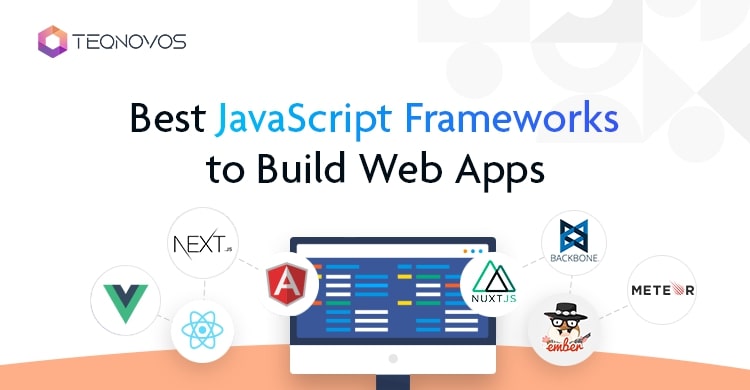8 Best JavaScript Frameworks to Build Web Apps
JavaScript is a highly popular programming language that powers the web. It is a client-side programming language that follows multiple paradigms, including procedural, functional, and imperative. JavaScript along with HTML and CSS are the core technologies that power the modern web. It allows us to create dynamic, feature-rich websites and web applications.
According to W3Techs, nearly 98.5% of websites make use of JavaScript. It indicates the extensive popularity of JavaScript among web developers. One of the biggest reasons for the widespread use of JavaScript is its frameworks. There are several JavaScript frameworks that are not only easy to use but are extremely powerful.
Here, we are going to list down the most popular javascript frameworks to build web applications. So, let’s get started!
What is a JavaScript Framework?
A JavaScript framework is a collection of pre-written JavaScript code that allows you to add certain functionalities to an app without the need to write code from scratch. As a result, JavaScript frameworks speed up the development process as you do not have to write code again and again for adding common features.
You can easily export a feature from a JS framework and add it directly to your web app or modify it as per your requirements. Developers today rely on many JavaScript frameworks to create modern web applications easily and quickly.
Most Popular JavaScript Frameworks for Creating Web Apps
The following are the best JavaScript frameworks that you can use to create powerful web applications.
1. React
React or ReactJS is the first choice of many developers for creating dynamic user interfaces for websites. Created by Meta, React is utterly suitable for the development of single-page applications and mobile applications. New updates are launched every now and then to improve the capabilities of React.
Many individuals get confused about the identity of React; whether it’s a library or a framework. React is a JavaScript library that you can use anywhere in the application according to your convenience. Unlike a framework, you are not bound to follow a specific set of rules to develop a web application. Despite being a library, the exceptional performance of React has made it compete with JS frameworks like Angular and Vue.js.
Pros
- Supports the creation of reusable components.
- Virtual DOM allows quick manipulation of on-screen elements.
- It’s easy to learn React.
- Easy to test and debug.
- You can use React in any part of a web application.
Cons
- Certain aspects of React, such as JSX and hooks are opinionated.
- Learning JSX is important to work with React, which is time-consuming.
2. Angular
Angular is another well-known JavaScript framework for developing single-page applications. While TypeScript is the standard language for working with Angular, you can still make the most out of it if you know JavaScript. The Angular framework is maintained by Google and gets regular updates.
Web applications created using Angular are fast and offer excellent performance. One of the most interesting features of Angular is Angular CLI (command-line interface). The Angular CLI makes it easy and effective to initialize and manage Angular projects.
Pros
- Facilitates the creation of progressive web apps.
- Easy to add animations.
- Ideal for creating complex applications.
- DOM manipulation is easy.
Cons
- Angular is difficult to learn and implement.
3. Vue.js
Whenever searching for the top front end javascript frameworks, one particular framework that you need to consider in Vue.js. Released in 2014, Vue.js makes a great choice for building modern user interfaces and single-page applications. It follows the model-view-viewmodel (MVVM) architectural pattern.
Vue.js is a lightweight JavaScript framework and is extremely fast. Thus, you can develop web applications quickly by utilizing this framework. Several tools available with Vue.js makes the lives of developers easy, such as Vue CLI and debugging tools. Additionally, the framework supports server-side rendering and state management.
Pros
- It supports two-way binding.
- The concepts of Vue.js are easy to understand.
Cons
- Not a good choice for large projects.
4. Next.js
Next.js is among the popular javascript frameworks for building sophisticated web applications. It is a React framework that allows server-side rendering and generation of static websites. Vercel, which is a private company, developed Next.js and released its first version in 2016.
Web applications created using Next.js are SEO-friendly and fast. The server-side rendering feature makes it possible to generate the HTML code of a website on the server and send it to the client. This allows websites and web apps to load faster in the browser. Also, it allows the creation and reuse of components.
Pros
- Fast load time with lazy loading.
- Automatic routing.
Cons
- Build time grows exponentially with the increase in the size of the web application.
5. MeteorJS
MeteorJS is yet another popular JavaScript framework created using Node.js. It is widely known for its ability to create cross-platform code, which allows faster development of apps for multiple platforms, including web, iOS, and Android.
One key thing to notice about MeteorJS is that it is an isomorphic framework. You can use the framework for both front-end and back-end development. Developing applications with MeteorJS is easy with hundreds of packages available. Also, it is one of the best frameworks out there for developing real-time web applications, such as instant messaging apps and video streaming platforms.
Pros
- Full-stack solution for web app development.
- Possible to develop applications quickly.
Cons
- The use of too many packages can create issues.
6. Nuxt.js
Built on top of Vue.js and Node.js, Nuxt.js is the best JavaScript framework to speed up the development of web applications. The best thing about Nuxt.js is that it is easy to learn and implement. You can use it to create web applications with several features.
Nuxt.js generally competes with Vue.js and is considered to be a better option for certain reasons. For instance, Nuxt.js create a static version of a website, and thus it’s possible to deploy web applications without the need for a server. Also, web pages created with Nuxt are more SEO-friendly.
Pros
- Flexibility to choose between on-demand server rendering and static website generation.
- It’s easy to extend the functionality of apps with Nuxt modules.
Cons
- Not effective for handling high traffic.
7. Backbone.js
Backbone.js is a JavaScript framework that follows the MVC architecture. Launched in 2010, Backbone.js is among the oldest JavaScript frameworks. It is a lightweight JavaScript framework that is suitable for creating both web applications and mobile applications.
One advantage of using Backbone.js is that it allows you to write clean code. The framework is suitable for creating single-page applications. There’s no specific structure that you need to follow for developing web applications using Backbone.js. Many well-known companies that utilize Backbone.js include Airbnb and Atlassian.
Pros
- It is lightweight and fast.
- The coding conventions of Backbone.js helps to speed up the development process.
Cons
- Debugging is not easy.
8. Ember.js
Ember.js is a great choice for building scalable web applications. It supports two-way binding and is suitable for developing interactive web applications. The framework allows you to create server-side rendered web applications.
Ember.js follows the “convention over configuration” principle, which means that developers need to structure their applications using certain conventions. There are many tools and add-ons available for faster development of web applications with Ember.js, including Ember CLI, Ember Inspector, and Fastboot.
Pros
- Debugging becomes effective with Ember CLI.
- The use of a standard structure makes it easy to understand a codebase.
Cons
- Steep learning curve.
Which JavaScript Framework is Best for You?
While looking for the best JavaScript framework, you need to consider the requirements of the projects and your personal preferences. The primary reason for using a JavaScript framework is to simplify and speed up the development process.
When you are choosing a JavaScript framework, you need to keep in mind certain things, such as the type of web application, time limit, compatibility with other technologies used in the project, scalability, etc.
Always remember that there’s no one-size-fits-all solution when it comes to JavaScript frameworks. Each framework has its own set of advantages. You need to get familiar with the use cases of each framework. This will help you to identify the framework that best suits your needs.
Summing it All Up
We have listed the top JavaScript frameworks appropriate for creating robust web applications. While picking a framework for your next project, you should keep in mind the end goals of your project. Choosing the right framework will make a huge difference in ensuring the performance of your web application.
If you are unsure which JS framework might be the right one for your projects, you simply need the guidance of experts. At Teqnovos, we have a team of highly skilled and experienced developers who analyze your requirements to help you choose the most suitable JavaScript framework.
Additionally, if you already picked JavaScript and want to build a development team to work on your project, you can opt for our excellent outstaffing services. Hire JavaScript developers, React developers, Angular developers, and more from us at your convenience.
















